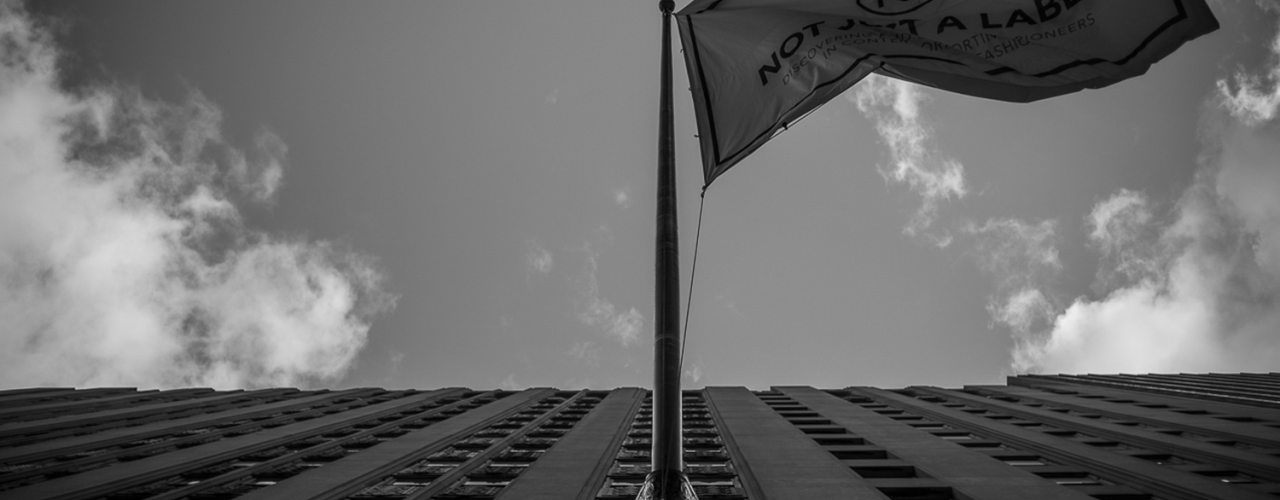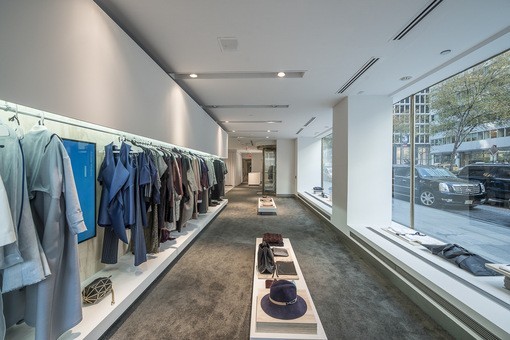Look Back

A Look Back on NJAL in NYC
In 2015 alone, NJAL has stirred a storm of activity that’s seen the digital platform eclipse its digital roots time and time again, to physically manifest in cities around the world with large-scale, immersive projects. Instead of closing out the year quietly, the NJAL team has spent the last few weeks in New York City, where the team opened NJAL’s landmark fashion hub at the iconic Waldorf Astoria New York. With crucial backing from the New York Economic Development, it was all part of a mission to support and accelerate the ‘Made in NY’ initiative, with a carefully-curated pop-up shop to showcase the very best of NJAL’s NYC design talent.

This holiday season, the NJAL team swapped their day-roles to set up shop at NOT JUST A LABEL | Made in NY, and cultivate a space beyond simply commerce but a real incubator for opportunity, connection and engagement. Alongside its retail operations, NJAL also played a host to a series of conversations on all things ‘Made in NY’, as part of its global workshop series ‘The NJAL Forum’, which has ambled the globe this year with pit stops in Beirut, Kiev, Los Angeles, Lisbon, and Milan to mention only a few. Within a few days of arrival in NYC, it was clear that NOT JUST A LABEL | Made in NY was going to be more than just a retail destination, and instead of competing with a slew of other pop-up shops in the city, NJAL carved out a new impetus–to simply eschew the generic pop-up shop format and its tired convention entirely, and honestly support NYC’s raw creativity.

NOT JUST A LABEL | Made in NY heralded both commerce and community, functioning as a physical base to support locally manufactured & sustainably produced fashion. With its dedicated space for conversation inside the shop, it organically morphed into a laboratory for real connection. At any given time, you could walk in and find designers catching up over coffee or meeting with a manufacturer introduced to them through The NJAL Forum. Over the course of 10 days, eager shoppers were also interested to know about the project’s premise, and after a thorough conversation (and a purchase), they always walked out with a new perspective on emerging fashion design, and more specifically on New York City’s local fashion economy.

All of the specially designed creations on view were more than simply finished products, but material artefacts ripe with the endless story of process – from fabric to manufacture, with stylistic stories stitched into every seam. It was these typically airbrushed details that enthusiastic shoppers really responded to, because it was spotlighted, discussed and celebrated. Perhaps that’s why sales figures shattered initial expectation and proved why NOT JUST A LABEL | Made in NY was necessary to facilitate a refreshing angle on what it actually means to produce locally?

With a flurry of press attention (read The New York Times’ review, The Guardian’s report, and Fashionista's in-depth essay) as well as key support from industry impresarios and fashion industry fixtures, the opening of NOT JUST A LABEL | Made in NY was feverishly anticipated by all involved. On December 3rd, NJAL finally swung open its gilded doors at the Waldorf Astoria New York to showcase a stark white space with warming accents. Both modern and welcoming, NJAL applied an architectural design concept that preserved elements of the Waldorf’s iconic opulence, while indulging NJAL’s affinity for minimal modernism. The space was a raw canvas, typified by these small details of aesthetic restriction, which in turn allowed NJAL’s cross-merchandising efforts of more than 100 emerging designer’s distinctive wares to really hone focus and hold attention.

For example, looking closely at one of Alexander Nam’s ice-blue pieces, like her sheer organza collared shirt and you would immediately note the simplicity of shape and precise seam work that becomes a subtle decorative detail. Against the backdrop of NJAL’s carefully considered interior, Nam’s exhaustive process and practice becomes totally visible, caressing the senses and demanding to be delicately handled. Opening up Nam’s layered trench coat is a similarly ethereal experience. With its draping overlocks of excess fabric, anchored by a strict shape and aptly placed military accents, you would begin to see that this statement piece of outerwear is meticulously clean. Try it on, as many shoppers did and you’ll feel its utter weightlessness despite its volume.

It is these delicious details that were most stimulating for the NJAL team in particular. As the platform usually exists digitally, being able to transcend its ephemeral roots and manifest physically with the carefully crafted creations of its design base in tow is always an enriching experience. Operating as a retail outlet in New York City, NJAL was ecstatic to share the winding journey of creativity behind these products, and explain the origin story behind fabric choices or even the placement of a particular metalic button with infectious zeal to anyone who was interested. So many of the participating designers stuck around too, to chat with shoppers in a relaxed environment, and to relay a more intimate approach to luxury retailing that’s probably alien to most temporary retail activations.

Yet, this is just another fundamental example of why NOT JUST A LABEL | Made in NY is so incredibly critical–not just for the legacy of Made in NY, and championing both local and sustainable modes of production but for the very notion of creativity as a whole. Unlike other pop-up shop concepts, NJAL ensured designers saw the entirety of costs related to showcasing covered, thanks to the ‘Made in NY’ initiative, and in virtue of NJAL’s core mission to support design talents without borders, financial burden or politics. While emerging designers often join in on temporary retail activations, the atmosphere can be competitive and somewhat hostile. NOT JUST A LABEL | Made in NY worked to usurp this trend entirely, and created a productive and supportive environment where alongside successful commerce, real friendships, mentorships and profitable connections could be fostered in a credible way.

The NJAL Forum was an elemental component to this, and NJAL’s carefully curated daily programming ensured constant conversation, the sharing of ideas, and a tangible space where accidental synergies could catalyse creativity in the most unexpected ways. On the opening night, industry impresarios such as Kelly Cutrone served candid advice (ice-cold, of course) to a room full of budding design talent. As the panel discussion debated the division between the design and manufacturing sectors in NYC, Cutrone bluntly said, “Well, why don’t designers learn the necessary skills themselves?” Though Cutrone was referring to the limited capabilities of some “celebrity” designers, she acknowledged that most designers are versed in the basics and even the most skilled of designer talent require the technical expertise of a factory to realise a product. Other panel discussions exploring manufacturing innovation specifically were hugely popular with designers, and NJAL’s panel of factory owners delivered some key advice to emerging talent. I even learned something new, like the fact that the most common mistake made by designers going to a new factory is underestimating the timeline of production. JR Morrissey, a NYC-based apparel manufacturer delivered some astute advice by simply saying, “Start small and go slow.” That's valuable advice to the fresh graduates cutting their reeth and musing production on their debut collection.
Night after night, the energy was palpable as hoards of designers, students, press and even curious passersby poured into the space with an appetite for knowledge. After each and every discussion, no matter whether it was a group of manufacturers discussing the industry’s needs, or designers with a celebrity cult following such as Adam Selman talking about the relevance of the fashion show—attendees were always switched on, engaged and instinctively jumped at the chance to field questions to panelists. Later in the week, a critical discussion around fashion education saw Shelley Fox (Parsons’ Donna Karan Professor of Fashion, and Director of MFA Fashion Design and Society) declare that, “being in a bubble is no longer relevant.” It’s an informed diagnosis (with a typically pointed English sensibility) from one of the world’s most experimental thinkers in fashion research and design. The crowd was a mix of both students, and practising designers who for the most part questioned whether fashion education had become too ubiquitous, churning out more and more graduates in an industry with less and less jobs available. Though it’s a loaded question, tied up in a complex web of answers–a common stripe of response to this concern was for designers to adopt more flexibility and consider avenues that they’ve never envisioned for themselves. At the end of NJAL’s residency at the Waldorf Astoria New York, the digital platform defied commerce orthodoxy, to cultivate a dualistic space for both successful retail and informative engagement.

NOT JUST A LABEL | Made in NY might have closed its gilded doors at the Waldorf Astoria New York, but NJAL will continue in its core mission to support and nurture craftsmanship and independent design. As the year comes to an end, NJAL urges you to join NJAL in reshaping the landscape of fashion for the better, and NJAL’s first NYC flagship is a key milestone in this winding journey to igniting seismic change and dramatic shifts.













